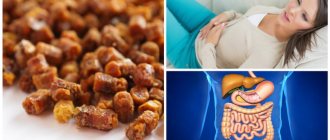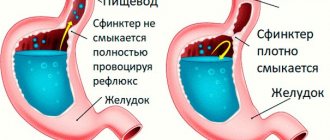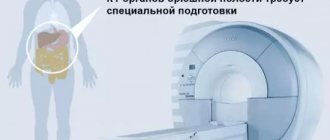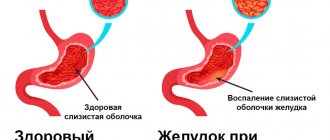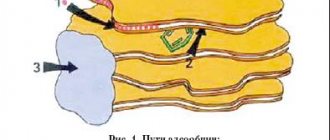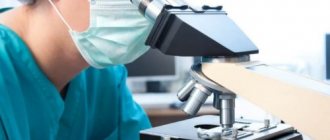250 856
16.02.2022
7 minutes
Author, editor and medical expert - Klimovich Elina Valerievna.
Editor and medical expert - Harutyunyan Mariam Harutyunovna.
Heaviness in the abdomen, nausea and belching, which usually occur after eating, are referred to by doctors as “dyspepsia”.
According to statistics, stomach upset is regularly experienced by 25% of adults, and in some cases it is combined with diarrhea1,2.
Symptoms of dyspepsia1,2
- Discomfort in the epigastrium - the upper part of the abdomen under the sternum, where the ribs meet. The intensity of sensations varies from person to person: from heaviness and burning to cutting and squeezing pain that appears after eating. At the same time, the pain is never very strong and does not radiate to other parts of the abdomen.
- A feeling of fullness in the stomach after eating a small amount of food, forcing you to stop eating.
- Feeling of food stagnation in the stomach.
- Nausea and belching.
Dyspepsia is often accompanied by symptoms of digestive disorders: bloating, rumbling and heaviness in the abdomen, stool disorders, including diarrhea caused by concomitant intestinal disorders2.
Symptoms of indigestion
Digestive disorders can manifest themselves in various symptoms2:
- rumbling in the stomach, flatulence;
- heaviness in the stomach after eating;
- abdominal pain;
- constipation, diarrhea, feeling of incomplete bowel movement;
- nausea, vomiting.
Symptoms of digestive disorders in children can appear even after minor overeating or changes in the usual diet, since the children's digestive tract can be sensitive to unusual foods. If a child's indigestion is caused by a bacterial or viral infection, signs of intoxication may appear or the temperature may rise2. In teenagers, digestive problems may arise due to frequent snacks on the run or fast food, which can lead to problems such as gastritis or duodenitis. Gastritis is a familiar name, but duodenitis may sound scary. In fact, everything is simple: duodenitis is associated with an inflammatory process in the intestines, which, in turn, can lead to poor digestion of food. This occurs due to the fact that digestive enzymes, which help the body break down and absorb food, “suffer”2.
A similar relationship (inflammation in the intestines and digestive problems) can also occur in other conditions, for example, intestinal infections, allergic reactions, rotavirus infections, etc.2.
Do Digestive Problems Mean Disease?
Where do digestive problems come from? In most cases, digestive problems are functional, that is, they are not a consequence of the presence of any diseases of the stomach or intestines. Very often they appear after eating certain so-called difficult-to-digest foods - for example, mushrooms, fried or very fatty foods.
Eating fried foods
Some people feel that they have digestive problems after eating sweets or hot spices. This depends on the individual sensitivity of the gastrointestinal tract to different foods. In some cases, especially in people over 40 years of age, dyspepsia may be caused by an organic disease of the gastrointestinal tract.
These diseases:
- esophageal carcinoma;
- stomach cancer;
- gastritis caused by Helicobacter pylori infection.
In some cases, dyspepsia can be caused by stress or depression.
Causes of indigestion
Each organ of the digestive system takes part in the digestion of food and the removal of metabolic products from the body2.
The most common causes of indigestion are 2:
- the habit of eating in a hurry, on the run;
- the predominance of fats and simple carbohydrates, semi-finished and instant foods in the diet;
- lack of plant products in the diet (vegetables, fruits, legumes and whole grains);
- lack of digestive enzymes resulting from poor nutrition, inflammation in the intestines, disruption of the digestive system;
- constant stress.
Digestion is one of the steps of another complex and vital process, metabolism. Failures in the process of digesting food (digestive disorders) not only add physical inconvenience, they can significantly affect well-being.
When and what tests should be done for digestive problems?
Treatment of digestive problems, unfortunately, is difficult and not always effective. The treatment method depends on the root cause, so you should always carry out a diagnosis and exclude possible diseases that result in digestive problems.
Among the diagnostic options, the most important is to perform gastroscopy, that is, an endoscopic examination of the inside of the upper gastrointestinal tract - the esophagus, stomach and duodenum. A test for Helicobacter pylori should also be performed.
Gastroscopy is absolutely necessary if so-called anxiety symptoms appear:
- dysphagia (dysphagia);
- pain when swallowing (odynophagia);
- sudden unintentional weight loss;
- dyspeptic symptoms that occur at night, awakening the patient from sleep - especially abdominal pain;
- jaundice;
- gastrointestinal bleeding;
- anemia;
- palpable epigastric mass on physical examination.
Weight loss
Pain when swallowing
Treatment of indigestion
Basic principles of treating digestive disorders2:
- adjusting the diet towards a healthy and nutritious diet.
- healthy sleep (for an adult 7-9 hours).
- giving up alcohol and smoking, which irritate the mucous membrane of the stomach and intestines, maintaining a constant inflammatory process. If sudden changes in lifestyle are difficult, you need to at least limit bad habits. For example, reduce the number of cigarettes you smoke.
The main goal of treatment is to restore the natural process of food digestion, eliminate digestive problems, and relieve symptoms. To do this, the following rules must be observed:
1. It is not recommended to overeat before bed, because... food can take a long time to pass through the digestive tract and cause discomfort.
2. Nutrition should be complete and varied, consisting of foods high in fiber.
3. In cases of malnutrition (for example, when eating a lot of fatty foods), digestion can be supported with special medications.
Causes of digestive problems
Dyspepsia may have an organic cause - it is caused by gastrointestinal diseases, for example, gastroduodenitis, enteritis, intestinal polyps, stomach or intestinal cancer. But much more common is the so-called functional dyspepsia, the cause of which is not fully understood.
The following mechanisms of functional dyspepsia are postulated:
- motility disorders of the upper gastrointestinal tract - too slow gastric emptying, accumulation of gastrointestinal contents from the duodenum to the stomach;
- excessive secretion of hydrochloric acid and its too intense effect on the mucous membrane of the stomach and duodenum;
- abnormal reaction of the gastrointestinal mucosa to the composition, temperature, composition and structure of food.
CREON® capsules for better digestion
The digestive process is inextricably linked with pancreatic enzymes. These special substances perform an important role: they help the body digest and absorb food. Errors in nutrition, consumption of fatty foods or incompatible foods can affect your well-being and cause heaviness after eating, discomfort, and bloating. This happens when the body’s own strength (the usual amount of enzymes) is not enough to digest what is eaten.
Creon® contains digestive enzymes identical to those produced by the body3. By delivering them from the outside, the drug complements its own digestion and helps cope with the symptoms of indigestion: heaviness and discomfort after eating.
To learn more
Creon® is a convenient modern product in the form of capsules, each of which contains hundreds of small particles - minimicrospheres. Each of the Creon® particles does not exceed the size of 1.7 mm - they are so tiny3. This size is designated for a reason: modern scientific works, Russian and world scale, are unanimous that an effective enzyme preparation should have particles less than 2 mm in size5-8. Today, only Creon® meets the size requirements*4 and is therefore considered the first choice for better digestion, which cannot be said about the well-known drugs in tablet form**1,4,5,9. Their time, unfortunately, has passed, and today they are recognized as the least effective5,9.
The Creon® capsule has no equal:
No. 1 in the world
for better digestion10
15 minutes
and Creon® is maximally active11, 12
Digestive disorders of the gastrointestinal tract: dyspepsia
Details Author: LDC Neuron Published: November 10, 2015
Dyspepsia is a digestive and gastrointestinal disorder, a complex of symptoms characteristic of many diseases, as well as borderline conditions. The main causes of dyspepsia are a lack of digestive enzymes, causing malabsorption syndrome, or, what happens most often, gross errors in nutrition.
Enzymatic dyspepsia is a disorder associated with the enzymatic activity of the digestive organs.
Functional dyspepsia (FD) is a complex of unpleasant symptoms after eating. However, no organic pathology is detected during the examination. In almost half of the cases, FD occurs in combination with irritable bowel syndrome, so experts classify it as a group of biopsychosocial diseases.
The main causes of Functional dyspepsia include psychological trauma and stress.
These factors are identified in most patients with functional dyspepsia. In some cases, the cause of the disease is an increase in the susceptibility of the gastric wall to stretching; in such patients, as a rule, the motor function of the stomach is not impaired. If the pathology is accompanied by symptoms characteristic of a peptic ulcer, then the cause of dyspepsia in this case may be the release of hydrochloric acid in a volume exceeding the norm.
Intestinal dyspepsia can develop due to poor nutrition, in which case it is called nutritional dyspepsia . In the development of intestinal dyspepsia, constitutional weakness of the intestine, as well as sensitization (hypersensitivity) to certain types of food - protein, carbohydrate or fat, are of known importance. There are fermentative, putrefactive and fatty dyspepsia.
Fermentative dyspepsia is caused by excessive consumption of foods rich in carbohydrates: fruits, legumes, cabbage, kvass, honey, etc., as a result of which acidophilic (fermentable) flora is formed in the intestines. Along with changes in intestinal flora, a certain role in the development of fermentative dyspepsia is played by the reduced secretion of diastase by the pancreas, as a result of which the process of carbohydrate breakdown is disrupted.
Putrefactive dyspepsia occurs with excessive consumption of foods of protein origin, especially those that require a long time to digest. Toxic substances formed during the breakdown of proteins cause intoxication of the patient's body. This mainly applies to red meats (lamb, pork, beef) and their derivatives (sausages and other meat products), the abuse of which stimulates the development of putrefactive intestinal microflora. Fatty (soapy) dyspepsia. Caused by eating too much refractory fats, such as lamb and lard and their derivatives.
Dyspepsia, which is a consequence of enzyme deficiency, is of the following types:
- Hepatogenic (liver origin);
- Cholecystogenic (caused by impaired bile secretion);
- Pancreatogenic (lack of pancreatic enzymes);
- Gastrogenic (caused by disruption of the secretory function of the stomach);
- Enterogenous (disturbed secretion of intestinal juice);
- Mixed dyspepsia.
Creon minimicrospheres® - what are their advantages?
1. Complete digestion of food. When it enters the stomach, the Creon® capsule quickly dissolves, and the smallest particles are evenly mixed with food3,12. This allows them to participate in the digestion of the maximum amount of food eaten.
2. 1 capsule of Creon® 10000 - this may be enough for heaviness after eating3. The number 10,000 indicates the amount of the lipase enzyme, which is responsible for the breakdown of fats. For comparison: in some well-known tablets the lipase content does not exceed 3,500 units, this is almost 3 times less than Creon® 10 0003. That is why their instructions for medical use indicate that an additional 2 to 4 may be required 13 tablets per dose.
More information about the action of the drug and its advantages over analogues can be found here. Creon® is recommended to be taken with meals or immediately after3.
